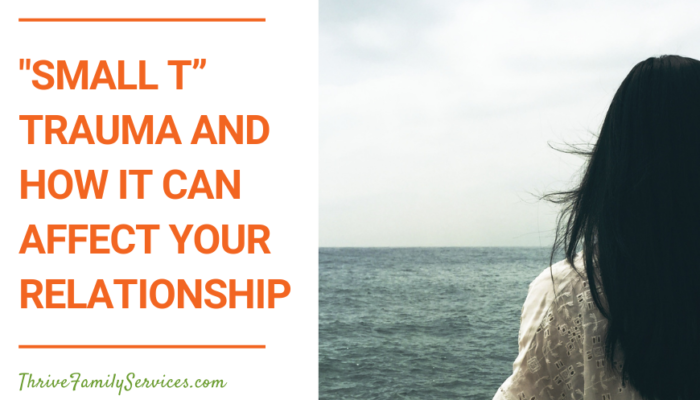Like many emotional experiences, trauma can come in all shapes and sizes. When we think of the word “trauma”, we typically think of a big, life-changing or life-endangering event, like a natural disaster, sexual assault, a car accident, a terrorist attack, or combat.
While these things can all be sources of trauma, there are other things that can cause trauma as well. To differentiate between the different types of trauma, we describe trauma as either big “T” Trauma or little “t” trauma (or small “t” trauma).
Trauma is anything outside of the range of normal human experience that overwhelms the central nervous system.
If you’re thinking, “Wait just a minute, that’s a pretty broad definition! What does normal mean anyway?”
There are different levels of trauma that we can use to differentiate what we mean when we talk about trauma. Events like the ones listed above, like terrorist attacks, serious accidents, and other life-threatening situations can trigger PTSD. However, other experiences can trigger PTSD as well. Obviously, experiencing something like a terrorist attack would be outside of the normal range of human experience and therefore a trauma.
Here are some other examples of big “T” Trauma:
- Deaths involving children, or those that are sudden, scary, or violent
- Sexual assault
- Car accidents
- Plane accidents
- Serious injury
- Natural disasters
- Military combat
- Extreme poverty
On the other hand, many of us have experienced childhood experiences or family dynamics that could be considered relatively common, but that leave invisible emotional scars all the same. Small “t” traumas can be anything that registers as unsafe and can often fundamentally change the way we experience the world or that relationship.
Some small “t” traumas fall under the category called Developmental Trauma. Developmental Trauma results from chronic problems in our most important attachment relationships, primarily during childhood.
Humans are wired for connection and safety, so any time there is a perceived or real lack of physical or emotional safety with someone who cares for us or who we love, the brain registers the experience as painful and possibly endangering. If this lack of safety happens repeatedly, a person will likely develop small “t” Developmental Trauma, which can affect how safe or not the world feels and how we react to it.
Think about all of the body-based metaphors people use to describe painful emotional experiences, and you get a sense of the enormous potential impact of small “t” trauma:
- Gut-wrenching
- Brought me to my knees
- Obliterated me inside
- I fell apart
- A knife to my heart
- Makes me want to vomit
- Punch in the gut
- My heart broke into a million pieces
Dynamics that lead to little small “t” trauma include lack of emotional safety; parental figures not being consistently reliable sources of love or stability; parents being unavailable or overly distracted with things in their lives; abandonment; or rejection.
People can also experience small “t” trauma later in life or outside of their families, for example when painful breakups occur, a spouse or partner has an affair, someone loses a job, or someone is bullied at school.
“Normal” is different to everyone, so what is traumatic to someone might not be traumatic to someone else. This is where small “t” trauma comes in. Small “t” trauma is anything that is highly distressing to the individual, but can be harder to spot than any big “T” Trauma. We all experience little “t” trauma from time to time.
Here are some examples of little “t” trauma:
- Growing up with caregivers who weren’t emotionally responsive
- Emotions being avoided, rejected, discouraged, or minimized
- Parental figures being unavailable or abandoning
- Witnessing abuse or violence
- Lack of emotional safety in family relationships
- Emotional abuse, including being called names or being rejected
- Messy breakups
- Gaslighting
- Financial hardship
- Career changes
- Infidelity
- Loss of a pet
One key aspect of small ‘t’ trauma is the effect that it can have when it accumulates and begins to change the way we relate with others. Small traumas add up. Small traumas aren’t life-threatening, but many small traumas compounded together can increase a person’s distress level and interfere with their emotional functioning. This is especially true if you experience several small traumas in a short period of time.
Small traumas can leave you feeling hopeless, disconnected, and stuck, which can all have negative effects on relationships. After all, relationships are built on connection, so when there are obstacles in the way of connection, relationships will suffer.
Just because we all experience small traumas from time to time doesn’t mean that we’re all bound to suffer endlessly. We all have different levels of resilience, or the ability to cope with stress. Our levels of resilience can change depending on the context of the situation. For example, your level of emotional resilience might be lower than it normally is after over 6 months of COVID-19 and election stress.
It’s important to remember that there’s nothing wrong with having a low level of resilience, because it won’t stay the same forever.
Emotional resilience is something you can work on, and humans are beautifully wired to help each other heal and become more resilient. A great way to build up your emotional resilience is to work with a therapist who can help you work through some of those old negative beliefs and help you figure out what is true. EMDR is one therapy tool that can help individuals heal from traumas big and small.
At Thrive, our goal is to help people heal relationally, whether that means family therapy to repair things long broken, learning to feel safe in your partner’s arms if you never felt that way as a kid, learning to open up to your partner about the impact of these traumas, and/or healing internally with your individual therapist by processing trauma and creating corrective emotional experiences with yourself.
It might take some practice to get used to talking to your partner or even a therapist about these things, but the upside is that you don’t have to carry these traumas on your own any more. To share them is to begin to heal them. We are here to help you overcome and begin to experience safety, caring, and connection to heal when the dragons echo in your current life.




